Residents of Syria’s Ghouta want a reinvestigation of the chemical attack

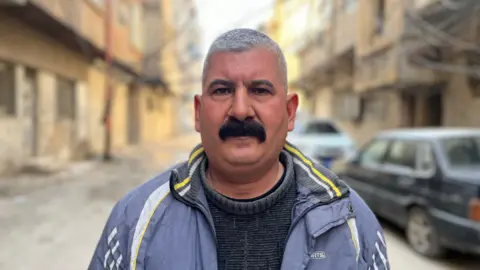 Aamir Peerzada/BBC
Aamir Peerzada/BBCTawfiq Diam is emotionally upset because this is the first time he can talk freely about what happened to his family in 2018, in Douma in Eastern Ghouta, which is under Damascus.
“If I had spoken before, Bashar al-Assad’s soldiers would have cut out my tongue. They would have cut my throat. We were not allowed to talk about it,” he said.
Tawfiq’s wife and his four children aged between eight and 12 – Joudy, Mohammed, Ali and Qamar – were killed in a chemical attack on 7 April 2018.
The Organization for the Prohibition of Chemical Weapons (OPCW), a global watchdog, said in a report last year that it believed a Syrian helicopter took off from Dumayr airport shortly after 19:00 that day and dropped two yellow cylinders. hit two flats, releasing highly concentrated chlorine gas.
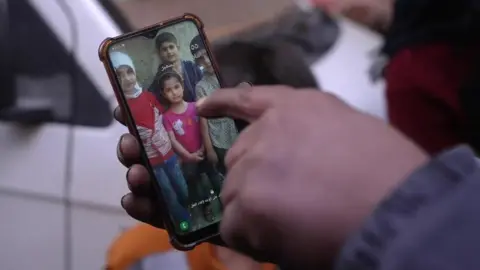
Tawfiq said his family was outside his ground floor house when the bombs went off.
“I heard explosions and people shouting on the streets saying ‘chemicals, chemicals’ and I ran out, it smelled bad, I saw yellow foam coming out of people’s mouths, my children could not breathe, they were suffocating. I saw people lying on the street,” he said.
The OPCW says at least 43 people have died. Tawfiq says more than 100 have died.
“Even I almost died. I stayed in the hospital for 10 days. Only five or six men survived in this area,” he said.
Assad’s government has denied ever using chemical weapons. And its ally Russia said the Douma attack was “done”.
Eastern Ghouta has been one of the most besieged areas during the five-year civil war in Syria.
The regime ended up besieging it, along with its ally Russia, indiscriminately bombing the area as it wanted to control it from the rebels led by the Jaish al-Islam group.
Going through it now, the destruction wrought upon it is all around us. It’s hard to find a single building that doesn’t have the scars of war, many of which are badly bombed, shelled buildings.
On more than one occasion in Eastern Ghouta, chemical weapons – banned by the Geneva Protocol and the Chemical Weapons Convention – were used to attack Douma.
Bashar al-Assad’s forces captured Douma shortly after the chlorine attack, and the news of the dead went completely silent.
“Not a day goes by that I don’t think about my children,” said Tawfiq, taking out the only picture of them that he has, his eyes welling up with tears.
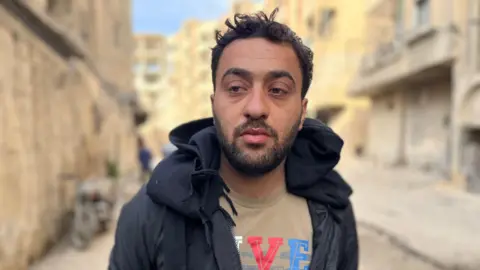 Aamir Peerzada/BBC
Aamir Peerzada/BBCAs we talk to Tawfiq, many people come to us to tell us their stories.
Khalid Naseer says his young daughter Nour, his two-year-old son Omar, and his pregnant wife Fatima were also killed in the 2018 chlorine attack.
“Most of those killed were children and women.”
The anger that he had to suppress for six years is coming out.
“The whole world knows that Bashar al-Assad is an oppressor and a liar, and that he killed his own people. My wife was killed two days before she gave birth to our child,” he shouted, emotions running high.
The chlorine gas attack was not the only time chemical weapons were used in the area.
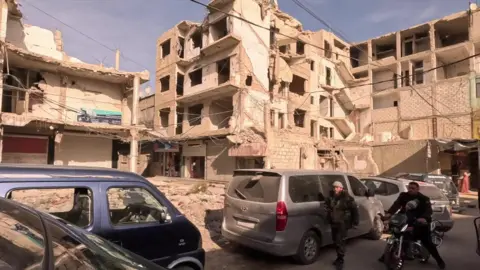
In 2013, rockets containing the nerve agent sarin were fired at several rebel-held areas in Eastern and Western Ghouta, killing hundreds of people. UN experts confirmed the use of sarin but were not asked to suspect it.
Assad has denied that his forces fired the rockets, but he has agreed to sign the Chemical Weapons Convention and destroy Syria’s declared arsenal.
Between 2013 and 2018, Human Rights Watch documented at least 85 chemical weapons attacks in Syria, blaming the Syrian government for most of them.
In addition to Douma in 2018, the OPCW’s Investigation and Identification Team identified the Syrian military as the perpetrator of four other cases of chemical weapons use in 2017 and 2018. A previous fact-finding mission, which was not authorized to identify perpetrators, has been found. chemical weapons were used in 20 cases.
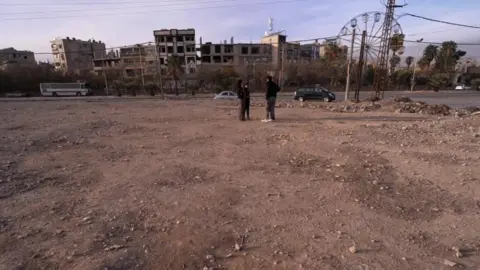
Khalid and Tawfiq took us to a roadside mound, a short drive away. They believe that this is where the state took the bodies of their families and buried them in a mass grave.
If you look down, among the stones, mud and stones, fragments of bones are visible, although it is impossible to tell if they are human remains.
“This is my first time setting foot here, I swear to God. If I had tried to come here before, [the regime] I would have killed,” said Tawfiq.
“During Eid, when I used to miss my family, I would ride on the side of this road and take a quick look [the mound]. It made me cry.”
Tawfiq wants the graves to be dug up, so that he can give his family a decent burial.
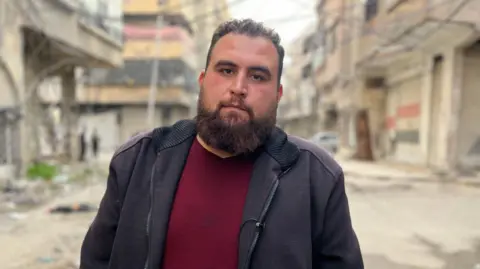 Aamir Peerzada/BBC
Aamir Peerzada/BBC“We want a new investigation into the attack,” Khalid said. He says the testimony given by many to the OPCW fact-finding mission in 2019 was unreliable.
It is a claim corroborated by Abdul Rahman Hijazi, one of the eyewitnesses who testified before the mission, who says he was forced to give the government’s explanation of the events.
“The police of the Intelligence Unit arrested me and said that they lied to me, that I did not say that people die from inhaling dust and not from chemicals. They threatened me that if I did not agree, my family would not be safe, and they told me that I am mine.” The house was surrounded by state men,” he said.
One of the findings of the 2019 OPCW report on Douma states: “Some witnesses stated that many people died in the hospital on April 7 due to shelling and/or suffocation due to smoke and dust inhalation.”
Abdul Rahman says he and his family were shunned by society for years after testifying. He found it difficult to find work.
Now he wants a new investigation.
“I want the truth to come out, I can’t even sleep because I want justice for every parent.”
Additional reporting by Aamir Peerzada, Sanjay Ganguly and Leen Al Saadi
Source link




